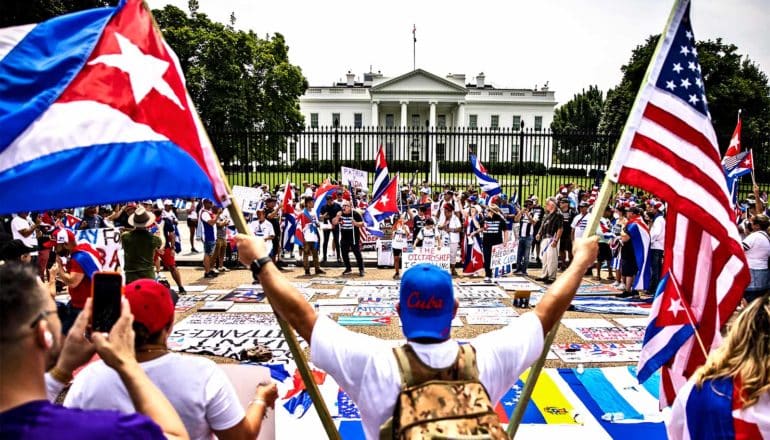
A new book chronicles the complex and intimate ties between Cuba and the United States.
For Ada Ferrer, professor of history and Latin American and Caribbean history at New York University, who has written three books about Cuba, the island nation is much more than the focal point of her scholarship. It is also deeply personal.
Born in Havana, between the Bay of Pigs Invasion and the Cuban Missile Crisis, Ferrer left the country, as an infant, with her mother in the spring of 1963—while many family members remained behind. They joined Ferrer’s father, who had previously been imprisoned by the Castro regime as a suspected counterrevolutionary, in New York City.
“Ours was not the only family torn apart by the revolution,” Ferrer wrote in the New Yorker earlier this year. “Between 1960 and 1962, thousands of children were sent abroad alone, their parents fearing that Fidel Castro’s government would ship them off to the Soviet Union for indoctrination. Young men of military age were forbidden from leaving. Some teenagers stayed behind when their parents fled, committed to a cause that their families rejected.”
While the experiences and perceptions of many Cuban Americans stem from the 1959 revolution, Ferrer notes that more recent Cuban immigrants may have very different views of their home nation.
“Forty-five percent of Miami Cubans left Cuba after 1995,” she says. “They’re the largest group among all Cuban Americans in Miami. So these are Cubans who didn’t know a Cuba before Fidel Castro. Many of them probably attended government rallies because their work required them to. So they have a very different experience than do older Cuban Americans, and, having left, they tend to be very, very virulently anti-Cuban government.”
The post-1959 lens tends to shape most discussions about Cuba in the United States today, which often focus on Castro or on Cuban Americans’ voting behavior in presidential elections. But that leaves a lot out, for two nations whose relationship stretches all the way back to the American Revolution.
“Cubans raised funds in support of Washington’s army, and soldiers from Cuba fought against the British in North America and the Caribbean,” Ferrer writes of that period in Cuba: An American History (Scribner, 2021), her new, comprehensive history of Cuba’s complex ties to the United States.
“As the thirteen colonies lost access to other British possessions, the Spanish colony of Cuba became a vital trading partner. In fact, Havana’s storehouse of coveted silver currency helped finance the new nation’s first central bank.”
The book reaches back to cover more than 500 years of Cuba’s history in shedding new light on the country’s relationship with the United States.
With the death of Castro in 2016 and the retirement of his brother, Raul, earlier this year, a new chapter of Cuba’s history is currently being written. The nation is in a time of transition, experiencing unrest over food and medicine shortages and larger political and economic concerns.
Here, Ferrer explains what careful study of the past can reveal about the present of both her native and adoptive countries:
The post Book: Cuba-US relations today are tied to the past appeared first on Futurity.
from Futurity https://ift.tt/3Bp39jC
No comments:
Post a Comment